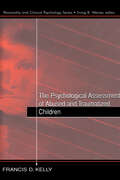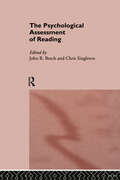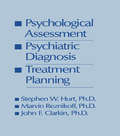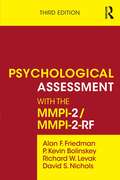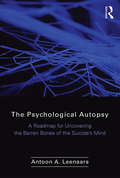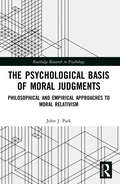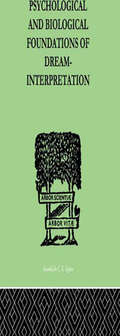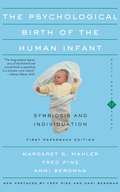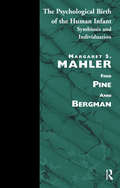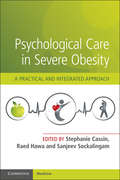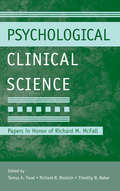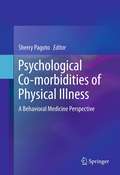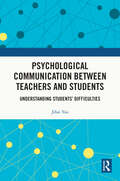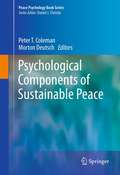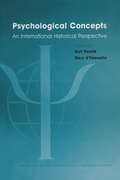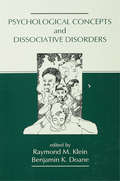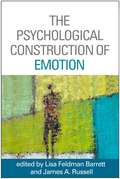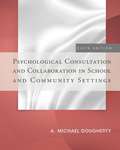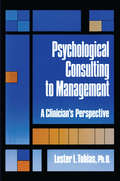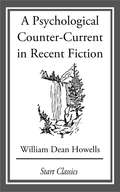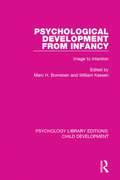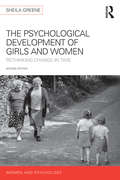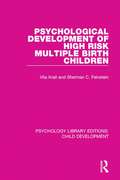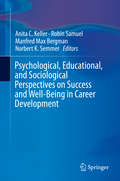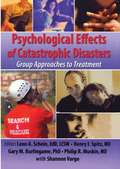- Table View
- List View
The Psychological Assessment of Abused and Traumatized Children (Lea Series In Personality And Clinical Psychology)
by Francis D. KellyThe past decade has seen more and more clinicians involved in the assessment and treatment of abused and traumatized children. They have contributed to an impressively large body of literature on the impact of abuse and trauma at all ages, the focus of which has been the short and long-term sequelae apparent in the child's behavior, emotional experience, and social interaction. But there have been few efforts to investigate the ways in which abuse and trauma damage the intrapsychic systems and structures that often guide, direct, and inform the child's manifest adjustment and functioning. The need to redress the balance was the major impetus for this book. Kelly offers a clinical paradigm for the personality assessment of abused or traumatized children via projective instruments--the TAT and Rorschach--and shows how various projective measures and indices can be utilized as sensitive barometers of changes in self, object, and ego functioning following therapeutic interventions and other corrective experiences. But further, integrating the tenets of trauma theory and those of psychoanalytic theory, he sets this clinical paradigm in a meaningful theoretical context, and draws on both theory and clinical experience to develop a comprehensive psychological composite of the child who has been maltreated. Part I provides an overview of theoretical models relevant to the assessment and diagnosis of the maltreated child. Contemporary psychoanalytic theory serves as one frame and is discussed first, with particular emphasis on object relations and ego functions. Equal attention is devoted to developmental psychology as another frame. Part II reviews relevant research. The Mutality of Autonomy Scale (MOA) and the Social Cognition and Object Relations Scale (SCORS) are introduced as examples of reliable and valid instruments readily employed to assess the impact of abuse or trauma on a child's object relations functioning. Additional Rorschach indices--boundary disturbance measures, thought disorder indices, trauma markers, and defensive functions measures--are discussed as measures of the impact on different facets of ego functioning. These various projective measures can be utilized as sensitive barometers of changes in self, object, and ego functioning following therapeutic interventions and other corrective experiences. Part III includes a variety of extended clinical illustrations. Seven cases of boys and girls subjected to varying degrees of abuse and trauma are presented to demonstrate the clinical utility of projective material for assessment, diagnosis, and treatment planning. For the clinician who takes the idiographical-phenomenological approach, appropriate given the uniqueness of each situation of abuse or trauma and the frequent brevity and barrenness of the protocol, such material can open a window onto a rich vista of the child's psychological terrain. The resulting map can point the way to wise decisions about type, timing, and level of therapeutic intervention, the resolution of such process issues as transference and countertransference, plus additional questions. Two cases of adult women who were abused as children and find themselves continuing to struggle with enduring unresolved issues vis a vis their own children are also presented. These cases underscore the value of TAT and Rorschach material, and object relations measures, in assessing and understanding the abusive and potentially abusive parent.
The Psychological Assessment of Reading
by John Beech Chris SingletonA useful guide to best practice including reviews of the latest and most helpful tests available. In Part One, contributors discuss the theory of reading assessment including issues such as screening, legal aspects, memory and visual problems, computer based assessment and the dyslexias. Part Two contains the review section where experts give comprehensive reviews of named tests.
Psychological Assessment, Psychiatric Diagnosis, And Treatment Planning
by John F. Clarkin Marvin Reznikoff Steven W. HurtFirst published in 1991. Routledge is an imprint of Taylor & Francis, an informa company.
Psychological Assessment with the MMPI-2 / MMPI-2-RF
by Alan F. Friedman P. Kevin Bolinskey Richard W. Levak David S. NicholsThis third edition apprises users of the MMPI-2/MMPI-2-Restructured Form (RF) for the ever-changing landscape of this dynamic personality/psychopathology instrument and its expanding utility in a variety of contexts. Two new chapters addressing the RC scales and the MMPI-2-RF are included in this updated text. Additionally, over 450 new references have been incorporated into the book, with information gathered and organized for practical clinical and forensic applications. The codetype interpretation chapter has expanded its sections with more in-depth feedback information and treatment considerations for clinicians to help in facilitating the formulation of treatment recommendations and strengthening therapeutic relationships with their clients. A number of special scales with clinical and forensic applications are also covered in this edition. An important section has been added addressing the MMPI and suicide. This new edition is a must-have resource that will inform and guide users of the MMPI-2 and MMPI-2-RF in their daily practices, and assist researchers in conceptualizing the operating characteristics and configural relationships among the various scales and indices that comprise this instrument. From simple single scale interpretation to complex configural relationships, this text addresses a broad bandwidth of interpretive information designed for text users’ at all levels of sophistication.
The Psychological Autopsy: A Roadmap for Uncovering the Barren Bones of the Suicide's Mind
by Antoon LeenaarsThe best way to grasp the essence of death scene investigation (DSI) is to witness its application, called the psychological autopsy, by an expert forensic scientist/clinician. This remarkable book affords the opportunity to delve into the challenges that the forensic mental health specialist and public safety professional confront in DSI. Suicides, and often death, are complex, multidetermined events. People, whether police investigators or mental health professionals, are generally perplexed, and even confused, when they are confronted by the equivocal case. Was it a suicide? Homicide? Accident? These are critical questions. Dr. Leenaars shows that DSI is, however, not mysterious; the reader can learn the generally accepted, evidence-based protocols of the psychological autopsy. Illuminated by individual (idiographic) case studies and general (nomothetic) research, this definitive guide allows the investigator to uncover the bare bones of a suicide or death.
The Psychological Basis of Moral Judgments: Philosophical and Empirical Approaches to Moral Relativism (Routledge Research in Psychology)
by John J. ParkThis volume examines the psychological basis of moral judgments and asks what theories of concepts apply to moral concepts. By combining philosophical reasoning and empirical insights from the fields of moral psychology, cognitive science, evolutionary psychology, and neuroscience, it considers what mental states not only influence, but also constitute our moral concepts and judgments. On this basis, Park proposes a novel pluralistic theory of moral concepts which includes three different cognitive structures and emotions. Thus, our moral judgments are shown to be a hybrid that express both cognitive and conative states. In part through analysis of new empirical data on moral semantic intuitions, gathered via cross-cultural experimental research, Park reveals that the referents of individuals’ moral judgments and concepts vary across time, contexts, and groups. On this basis, he contends for moral relativism, where moral judgments cannot be universally true across time and location but only relative to groups. This powerfully argued text will be of interest to researchers, academics, and educators with an interest in cognitive science, moral theory, philosophy of psychology, and moral psychology more broadly. Those interested in ethics, applied social psychology, and moral development will also benefit from the volume.
Psychological & Biological Foundations Of Dream-Interpretation (International Library Of Psychology Ser. #Vol. 20)
by Lowy, SamuelFirst Published in 1999. Routledge is an imprint of Taylor & Francis, an informa company.
The Psychological Birth of the Human Infant: Symbiosis and Individuation
by Margaret S. Mahler Fred Pine Anni BergmanThe pioneering contribution to infant psychology that gave us separation and individuation documents with standard-setting care the intrapsychic process of a child's emergence from symbiotic fusion with the mother toward affirmation of his own psychological birth. Available for the first time in paperback to a new generation of students and clinicians on the twenty-fifth anniversary of its original publication.
The Psychological Birth of the Human Infant: Symbiosis and Individuation (Maresfield Library)
by Margaret S. Mahler'The biological birth of the human infant and the psychological birth of the individual are not coincident in time. The former is a dramatic, observable, and well-circumscribed event; the latter a slowly unfolding intra psychic process.'Thus begins this highly acclaimed book in which the author and her collaborators break new ground in developmental psychology and present the first complete theoretical statement of the author's observations on the normal separation-individuation process. Separation and individuation are presented in this major work as two complementary developments. Separation is described as the child's emergence from a symbiotic fusion with the mother, while individuation consists of those achievements making the child's assumption of his own individual characteristics. Each of the sub-phases of separation-individuation is described in detail, supported by a wealth of clinical observations which trace the tasks confronting the infant and his mother as he progresses towards achieving his own individuality.
Psychological Care in Severe Obesity: A Practical and Integrated Approach
by Stephanie Cassin Raed Hawa Sanjeev SockalingamThis practical guide for the treatment of severe obesity and its related comorbidities covers evidence-based and emerging psychological interventions, including: motivational interviewing, cognitive behavioural therapy, mindfulness and compassion-focused interventions, technology-enabled psychological interventions and family-based interventions. The first resource of its kind to provide a detailed and integrated approach to using psychological treatments for obesity and its related comorbidities, this book will enable health care professionals to make decisions regarding the types of treatments that may be beneficial for particular issues, including disordered eating, psychological comorbidities, and treatment non-adherence. Case vignettes and clinical dialogues are used throughout to illustrate how to apply these treatments in clinical practice, making this book an essential read for any health care professional involved in the care of individuals with obesity, including psychologists, psychiatrists, physicians, nurses, social workers and dietitians.
Psychological Clinical Science: Papers in Honor of Richard M. McFall (Modern Pioneers In Psychological Science: An Aps-psychology Press Ser.)
by Teresa A. Treat Richard R. Bootzin Timothy B. BakerPsychological Clinical Science offers readers insightful appraisals of the most current theory and research in psychopathology and evidence-based intervention. It honors Richard McFall of Indiana University, a visionary psychological clinical scientist widely recognized for his unwavering advocacy for a science of clinical psychology and for
Psychological Co-morbidities of Physical Illness
by Sherry PagotoEvidence for the efficacy of behavioral approaches to the treatment and management of physical illness is mounting, as is the evidence for behavioral interventions for psychological disorders. A pressing question that remains is how to effectively treat co-morbid physical and psychological illnesses. Diseases co-occur more often than not, and the co-occurrence of physical and psychological illnesses is associated with greater impairment and healthcare costs. Unfortunately, the treatment literature has traditionally been disease-specific, with fewer insights and discoveries regarding the underlying processes of co-morbid physical and psychological illnesses, and even fewer of approaches to treatment. Research on co-morbidities between physical and psychological illnesses has focused primarily on depression. Quite extensive literatures describe the negative impact of depression on type 2 diabetes, cardiovascular disease, cancer, obesity, pain, and other physical illnesses. More recently, higher rates of physical illness have been documented in individuals with bipolar disorder, anxiety disorders, schizophrenia, and impulse control disorders. Studies emanating from the National Comorbidity Survey-Replication (NCS-R), the only U.S. population-based database that includes diagnostic information on all DSM-IV psychological disorders, have revealed strong links between a number of physical and psychological illnesses. These data draw attention to the prevalence of physical and psychological co-morbidities at the population level, which has stimulated research on the biobehavioral mechanisms of those co-morbidities, with the goal of developing and improving treatment approaches. As this area of research grows, practical resources are needed for clinicians and researchers who encounter individuals with co-morbid physical and psychological illnesses in their work. This book is the first to provide a comprehensive overview of psychological co-morbidities of physical illness, biological and behavioral mechanisms of those co-morbidities, and implications for treatment. Each chapter focuses on a physical condition, such as obesity, type 2 diabetes, HIV infection, tobacco dependence, cardiovascular disease, cancer, asthma, pain, irritable bowel syndrome, autoimmune disorders, and obstetric/gynecological conditions. Chapters are structured to cover 1) the epidemiology of the most prevalent co-morbid psychological disorders within that physical condition (e.g., depression and other mood disorders, anxiety disorders, psychotic disorders, impulse control disorders, and eating disorders; 2) biobehavioral mechanisms of the co-morbidity; 3) a review of the behavioral treatment literature including evidence-based practice guidelines (where available); and 4) treatment considerations including issues of stepped care, evidence-based treatment decisions, treatment sequencing, treatment blending, treatment interactions, and contraindications. Content is guided by available research evidence and relevant theoretical models, and it is presented in such a way as to inform clinical practice, identify important gaps in the research literature, and provide directions for future research. The book serves as a tool for clinicians and researchers who work in the area of behavioral medicine in medical, academic, and/or training settings. Patients with psychological and medical co-morbidities may be encountered by clinicians working in either mental health or medical settings, where the presenting problem could be either the psychological disorder or the medical disorder. As such, assessment and treatment issues are discussed from both perspectives. For the clinician, the book reviews brief assessment tools, provides practical summaries of the treatment outcome literature and treatment considerations (e.g., treatment sequencing, contraindications), and includes treatment decision hierarchies that help the clinician incorporate each facet of evidence-based decisions (the evidence, patient characteristics, and their own expertise). For the researcher, the b...
Psychological Communication Between Teachers and Students: Understanding Students’ Difficulties
by Jihai YaoPsychological communication between teachers and students is the essence of formal education. This book focuses not only on analyzing problems from the perspective of teachers but also from the perspective of students and provides educators with ways to communicate effectively with their students.It is necessary for teachers to be concerned with cultivating and stimulating the internal motivation of students’ development. This book discusses the significance of psychological communication and effective communication between teachers and students, the psychological preconditions of communication between them and strategies that teachers can utilize to communicate more effectively with their students. In addition, the author provides a large number of cases, psychological tests and exercises to help teachers have a better understanding of themselves, their students and to find more effective working methods, while establishing a democratic, equal and harmonious interpersonal relationship between them.Communication between teachers and students is an essential and indispensable component during the process of teaching and learning. This book thus will be of interest to teachers, students, and researchers of educational psychology, education management and those who are interested in teachers' professional development in general.
Psychological Components of Sustainable Peace
by Peter T. Coleman Morton DeutschScholarship on the psychology of peace has been accumulating for decades. The approach employed has been predominantly centered on addressing and preventing conflict and violence and less on the conditions associated with promoting peace. Concerns around nuclear annihilation, enemy images, discrimination, denial of basic human needs, terrorism and torture have been the focal points of most research. The Psychological Components of a Sustainable Peace moves beyond a prevention-orientation to the study of the conditions for increasing the probabilities for sustainable, cooperative peace. Such a view combines preventative scholarship with a promotive-orientation to the study of peaceful situations and societies. The contributors to this volume examine the components of various psychological theories that contribute to the promotion of a harmonious, sustainable peace. Underlying this orientation is the belief that promoting the ideas and actions which can lead to a sustainable, harmonious peace will not only contribute to the prevention of war, but will also lead to more positive, constructive relations among people and nations and to a more sustainable planet. The Psychological Components of a Sustainable Peace is valuable and stimulating reading for researchers in peace psychology, political psychology, and conflict resolution as well as others who are interested in developing a sustainable, harmonious world.
Psychological Concepts: An International Historical Perspective
by Kurt Pawlik and Géry d’YdewalleAmong the scientific advances over the last one hundred years, those in psychological science rank among the most prolific and revealing. The analyses of human intelligence and cognition, of human consciousness and self-awareness, of human memory and learning, and of human personality structure have opened up new avenues towards a deeper understanding of the human nature, the human mind, and its evolution. These new insights, whilst meeting high standards of research methodology, have also given rise to a conceptual grid which connects hitherto divergent lines of research in the human and behavioral sciences, leading up to present-day neuroscience.The Editors, both past presidents of the International Union of Psychological Science (IUPsyS), bring together a distinguished panel of international experts in the attempt to unravel, in a comparative cross-cultural and historical approach, changing contents and functions of psychological key concepts (such as intelligence, cognition, mind and the self). Their findings help to guide psychological theorizing, psychological experimentation and field research, and in so doing they apply behavioral science insights to the improvement of human affairs. Prepared under the aegis of the International Union of Psychological Science, the book exemplifies a concept-driven international history of psychological science.With its team of distinguished researchers from four continents, Psychological Concepts: An International Historical Perspective outlines the history of psychology in a truly innovative way.
Psychological Concepts and Dissociative Disorders
by Raymond M. Klein Benjamin K. DoaneThis book is based on a symposium that was inspired by the late Donald O. Hebb who, in his latter years while an Honorary Professor in the Department of Psychology at Dalhousie University, became very interested in the phenomenon of multiple personality and other dissociative states. Hebb was troubled by the lack of understanding of dissociative behavior and, through his discussions with basic science and clinical colleagues in psychology and psychiatry, he became convinced that the subject would be a figurative gold mine for psychological theory and experimentation. The purpose of the symposium was to bring together clinical and research scientists with an interest and expertise in dissociative phenomena such as multiple personality disorder, hysteria and hypnosis. This group would exchange ideas and findings, discuss theory, and lay the groundwork for an interdisciplinary research program into dissociative phenomena generally, and more specifically into multiple personality disorder and its principal precipitating factor -- physical and sexual abuse in children.
Psychological Construction of Emotion
by Lisa Feldman Barrett James A. RussellThis volume presents cutting-edge theory and research on emotions as constructed events rather than fixed, essential entities. It provides a thorough introduction to the assumptions, hypotheses, and scientific methods that embody psychological constructionist approaches. Leading scholars examine the neurobiological, cognitive/perceptual, and social processes that give rise to the experiences Western cultures call sadness, anger, fear, and so on. The book explores such compelling questions as how the brain creates emotional experiences, whether the "ingredients" of emotions also give rise to other mental states, and how to define what is or is not an emotion. Introductory and concluding chapters by the editors identify key themes and controversies and compare psychological construction to other theories of emotion.
Psychological Consultation And Collaboration In School And Community Settings (Sixth Edition)
by A. Michael DoughertyWith Dougherty's PSYCHOLOGICAL CONSULTATION AND COLLABORATION IN SCHOOL AND COMMUNITY SETTINGS, 6th Edition, you will see how human service professionals help others work more effectively to fulfill their work-related or caretaking responsibilities to individuals, groups, organizations, and communities. <p><p> This practical book uses a proven generic model for application, surveys various approaches to consultation, examines the organizational context of consultation, and reviews the numerous ethical and professional challenges that today's consultants face. As you work through the book, you can develop or refine your own personal model of consultation. Case studies bring concepts to life and help you learn how to deliver services most effectively. <p> This edition includes new content aligned with CACREP and other standards, an increased focus on school-based consultation, new material on cultural diversity, advocacy, social justice, prevention, systems theory, and ecological variables as they affect consultation and collaboration in counseling and psychology, and much more to help you prepare for professional success. Available with InfoTrac Student Collections http://gocengage.com/infotrac.
Psychological Consulting To Management: A Clinician's Perspective
by Lester L. TobiasFirst published in 1990. Routledge is an imprint of Taylor & Francis, an informa company.
A Psychological Counter-Current in Recent Fiction
by William Dean HowellsIt is consoling as often as dismaying to find in what seems a cataclysmal tide of a certain direction a strong drift to the opposite quarter. It is so divinable, if not so perceptible, that its presence may usually be recognized as a beginning of the turn in every tide which is sure, sooner or later, to come. In reform, it is the menace of reaction; in reaction, it is the promise of reform; we may take heart as we must lose heart from it. A few years ago, when a movement which carried fiction to the highest place in literature was apparently of such onward and upward sweep that there could be no return or descent, there was a counter-current in it which stayed it at last, and pulled it back to that lamentable level where fiction is now sunk, and the word "novel" is again the synonym of all that is morally false and mentally despicable.
Psychological Development From Infancy: Image to Intention (Psychology Library Editions: Child Development #2)
by Marc H. Bornstein William KessenOriginally published in 1979, this volume represented a unique attempt to connect the usually separated fields of infancy studies and studies of older children. In each chapter, eminent research workers attempt to cross the theoretical, empirical, and methodological barriers that had traditionally separated the study of preverbal infants from the study of verbal children and adults at the time. These completely new and original contributions traced the developmental links between birth and conversation within three major categories: perceptual, cognitive, and language development. Although the chapters range from reports of well-defined research areas to theoretical propositions, the aim throughout was to relate the events of the first year of life to the child’s later perceptual and cognitive activity. This book will still be of interest for all concerned with child development and related areas, in that it demonstrates the remarkable range of observations about infants brought under a single guiding set of questions about continuity, stability, and the sources of change during and after the first year of life.
The Psychological Development of Girls and Women: Rethinking change in time (Women and Psychology)
by Sheila GreeneChoice Recommended Read This thoroughly revised new edition updates Sheila Greene's original transformative account of the psychological development of girls and women and the central role of time in shaping human experience. Greene critically reviews traditional and contemporary theoretical approaches – ranging from orthodox psychoanalysis to relational and post-modern theories – and argues that even those that claim to focus on development have presented a view of women's lives as fixed and determined by their nature or their past. These theories, she believes, should be rejected because of their inherent lack of validity and their frequently oppressive implications for women. Essential but often neglected insights from the more compelling developmental and feminist theories are woven together within a theoretical framework that emphasizes temporality, emergence and human agency. The result is a liberating theory of women's psychological development as constantly emerging and changing in time rather than as static and fixed by their nature, socio-cultural context and personal history. Updated for a new generation of readers, The Psychological Development of Girls and Women will continue to be essential reading for students and researchers in the psychology of women, developmental psychology and women's studies.
Psychological Development of High Risk Multiple Birth Children (Psychology Library Editions: Child Development #4)
by Vita Krall Sherman C. FeinsteinOriginally published in 1991, this monograph presents pioneering work on the growth and development of triplets, quadruplets and quintuplets. Twelve years were spent researching the effects of multiple caregiving, low birthweight and intra-uterine conditions on the personality development of multiple birth children. Child development specialists, psychologists and clinical psychologists will find this work applies not only to multiple birth children, but also to those born with low birthweights or other high-risk complications.
Psychological, Educational, and Sociological Perspectives on Success and Well-Being in Career Development
by Anita C. Keller Robin Samuel Manfred Max Bergman Norbert K. SemmerThis collection covers how success and well-being relate to each other in early career development in the domains of employment and education. It gives a conceptual overview of success and well-being as established in the psychological research tradition, complemented by educational and sociological approaches. The volume presents articles on success and well-being in applied contexts, such as well-being as an individual resource during school-to-work transition, or well-being and success at the workplace. Work psychologists, social psychologists, educational researchers, and sociologists will find this book valuable, as it provides unique insights into social and psychological processes afforded by the combination of disciplines, concepts, and a diversity of approaches.
Psychological Effects of Catastrophic Disasters: Group Approaches to Treatment
by Philip R. Muskin; Henry I. Spitz; Gary M. Burlingame; Leon A. ScheinThere is relatively little literature on the psychological trauma caused by catastrophic disasters, including terrorist attacks and the impending threats of terrorism. Psychological Effects of Catastrophic Disasters: Group Approaches to Treatment fills that gap by comprehensively discussing ways to minimize the psychological damage resulting from catastrophic disasters as well as the trauma developed from the threat of future terrorist attacks.
